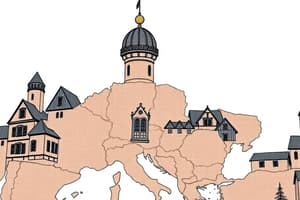Podcast
Questions and Answers
Which statement best illustrates the concept of popular sovereignty in the context of the 20th century?
Which statement best illustrates the concept of popular sovereignty in the context of the 20th century?
- The transition of many nations to democratic regimes by the year 2000. (correct)
- The rise of monarchies in Europe during the 1900s.
- The dominance of empires over nation-states.
- The establishment of the League of Nations as a governing body.
How did the Treaty of Westphalia impact the political landscape in Europe?
How did the Treaty of Westphalia impact the political landscape in Europe?
- It led to the disintegration of the Holy Roman Empire.
- It solidified the concept of state sovereignty and territorial integrity. (correct)
- It established a multipolar system of alliances among major powers.
- It initiated the practice of colonial expansion by European powers.
Which of the following accurately describes the state of bipolarity during the Cold War?
Which of the following accurately describes the state of bipolarity during the Cold War?
- A division between Western capitalist nations and Eastern communist bloc states. (correct)
- A powerful alliance of monarchies thwarting democratic movements.
- Multiple nations collaborating to prevent the domination of any single power.
- The collapse of empires in favor of new nation-states emerging.
What was a notable characteristic of colonial empires in the 20th century?
What was a notable characteristic of colonial empires in the 20th century?
Which of the following best represents the decline of the Holy Roman Empire?
Which of the following best represents the decline of the Holy Roman Empire?
What concept asserts that the legitimacy of authority is derived from the consent of the governed?
What concept asserts that the legitimacy of authority is derived from the consent of the governed?
What was a significant outcome of the Treaty of Westphalia in 1648?
What was a significant outcome of the Treaty of Westphalia in 1648?
Which rulers are associated with the consolidation of national states during the 18th and 19th centuries?
Which rulers are associated with the consolidation of national states during the 18th and 19th centuries?
Which event marked a de facto split within the Holy Roman Empire based on religious lines?
Which event marked a de facto split within the Holy Roman Empire based on religious lines?
How is the international system characterized after the Peace of Westphalia?
How is the international system characterized after the Peace of Westphalia?
What does the concept of 'cuius regio, eius religio' imply?
What does the concept of 'cuius regio, eius religio' imply?
What aspect of the political organization is replaced by the modern nation-state system?
What aspect of the political organization is replaced by the modern nation-state system?
Which of the following was NOT a participant in the Holy Roman Empire after the Thirty Years War?
Which of the following was NOT a participant in the Holy Roman Empire after the Thirty Years War?
Which concept is defined as the supreme authority in a political system, as described by Aristotle?
Which concept is defined as the supreme authority in a political system, as described by Aristotle?
What event is commonly associated with ending religious universal authority in Europe, giving rise to secular governance?
What event is commonly associated with ending religious universal authority in Europe, giving rise to secular governance?
What was a significant outcome of the military technology progression during the decline of the feudal system?
What was a significant outcome of the military technology progression during the decline of the feudal system?
Which term refers to the political and economic systems prevalent during the dominance of the Holy Roman Empire?
Which term refers to the political and economic systems prevalent during the dominance of the Holy Roman Empire?
What characterized the governance structure during the Middle Ages in relation to the Holy Roman Empire?
What characterized the governance structure during the Middle Ages in relation to the Holy Roman Empire?
Which of the following was a key feature of the governance in early political organizations compared to territorial states?
Which of the following was a key feature of the governance in early political organizations compared to territorial states?
During which period did the significant shift from feudalism to more centralized authority begin?
During which period did the significant shift from feudalism to more centralized authority begin?
Which political concept is most closely associated with the notion of a nation having its own independent government and territory?
Which political concept is most closely associated with the notion of a nation having its own independent government and territory?
Which of the following was a consequence of the Protestant Reformation?
Which of the following was a consequence of the Protestant Reformation?
In which manner did the decline of the feudal system affect local governance?
In which manner did the decline of the feudal system affect local governance?
Flashcards are hidden until you start studying
Study Notes
The Birth of the Modern State System
- King Henry VIII of England rejected papal authority and allied with other kings.
- This led to religious wars and the Kings increased their control over aristocrats.
- The Peace of Westphalia (1648) established the principle of Cuius regio, eius religio ("Whose realm, his religion").
- This led to the birth of the modern state system, where states are the primary actors in an anarchic international system.
- The Holy Roman Empire split into Catholic Habsburg realms (Austria and Spain) and Protestant entities (Holland and many German states).
- Catholic France and Protestant England existed outside the Empire.
18th and 19th Centuries
- Louis XIV of France, Frederick II of Prussia, and Peter the Great of Russia consolidated their national states.
- Key phenomena of this period were popular sovereignty, the westernization of the international system, and the evolution of the international system.
Early Political Organization
- Tribal organizations predate territorial states.
The Greek City State (Polis)
- Citizens: The Athenians were the world's first citizens.
- Sovereignty: Aristotle's concept of supreme authority being vested in law.
- Nationalism: The relationship between people, government, and territory.
- Democracy: Athens is the first example of democracy.
- The Greek city-states functioned in an international system similar to the modern one.
The Peloponnesian War
- Thucydides' work on the Peloponnesian War is associated with the realist perspective in International Relations.
The Roman Empire
- The Roman Empire transitioned from a city-state to a universal empire.
- This involved a transition from an oligarchic republic to an absolutist empire.
The Middle Ages
- Governance during this time was characterized by a universal authority with two layers.
- Religious Authority: The Catholic Church served as an integrating force, with monarchs ruling in the name of God and being subordinate to the Pope.
- Secular Authority: Multi-ethnic empires lacked any ethnic or cultural link and were governed by Emperors.
- Otto I became the Emperor of the Holy Roman Empire in 936 AD, signifying the establishment of a Christian-Roman universal state.
- The authority of the Church was progressively replaced by the authority of Emperors.
- Local Authority (Feudal System)
- Power was vested in God and not monarchs.
- Authority over territories was granted by God's church.
- The feudal system consisted of autonomous fiefdoms ruled by nobles.
- Nobles were more powerful than their monarchs with sovereignty.
The Decline of the Feudal System
- Progress of military technology (gunpowder) led to the need for larger states and the decline of universalistic authority of the Church and Holy Roman Empire.
- This was furthered by economic expansion, new commercial activity, and the rise of a powerful commercial class.
- This resulted in the rise of the burghers, a commercial class that dominated trade and manufacturing.
- This ultimately led to the Protestant Reformation and undermined the authority of the Church.
The Rise of the Multipolar System
- The international system featured multiple major powers, including: Britain, France, Prussia/Germany, Austria-Hungary, Russia, Italy, and the Ottoman Empire.
- Balancing alliances sought to maintain the balance of power and prevent any single power from dominating Europe and the rest of the world.
The Congress of Vienna
- This congress (1814-1815) established the Concert of Europe, a coalition of great powers, promoting multipolarity.
The Concert of Europe
- This system was based on the realist concept of balance of power.
England's Balancing Act
- England effectively balanced power between the fall of Napoleon and the rise of Germany (1815-1870).
The Rise of Germany
- This period saw two rigid, almost bipolar, alliances: UK-FR-Russia vs. Germany-Austria-Hungary-Italy
German Perception of Balance of Power in 1914
- Germany's perception of the balance of power ultimately contributed to World War I.
Europe in 1914 and 1922
- 1914 saw Europe as a collection of empires.
- By 1922, Europe primarily consisted of nation-states.
The League of Nations
- This organization represented a "Utopian" Liberalist approach to international relations.
The 20th Century: A Period of Rapid Global Change
- Significant structural changes:
- A decrease in monarchies, replaced by democratic regimes.
- The proliferation of international organizations, including the UN.
- A dramatic increase in world population.
- Rapid technological and scientific innovation.
- Expansion of the world economy and transportation.
- Environmental challenges such as pollution, deforestation, and depletion of the ozone layer.
Studying That Suits You
Use AI to generate personalized quizzes and flashcards to suit your learning preferences.




